What are Frenchies like with babies?
Welcome to our blog post, where we dive headfirst into the enchanting world of French Bulldogs and babies.
If you’re a parent or soon-to-be-parent thinking about bringing one of these cutie-patooties into your family, you’ve come to the right place. Frenchies are famous for their cuddly nature and calm demeanor, making them the perfect sidekick for your little munchkin.
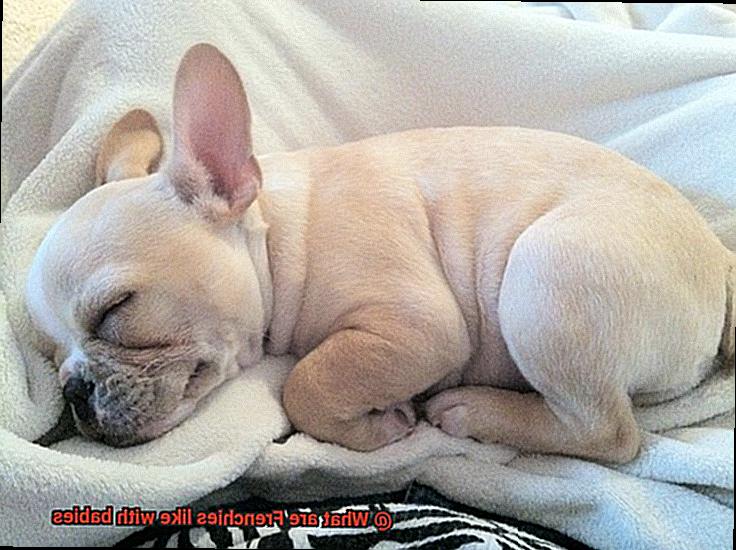
So, kick back, relax, and prepare to uncover just how French Bulldogs truly sparkle when it comes to nurturing an unbreakable bond with your precious bundle of joy.

The Protective Nature of French Bulldogs
Contents
- 1 The Protective Nature of French Bulldogs
- 2 Frenchies’ Adaptability to Different Environments
- 3 Playful Side of French Bulldogs and Babies
- 4 Supervising Interactions between Frenchies and Babies
- 5 Individual Temperaments of French Bulldogs
- 6 Socialization and Training for French Bulldogs
- 7 Introducing a Frenchie to a Baby Gradually
- 8 Monitoring the Behavior of a Frenchie Around Babies
- 9 Conclusion

French Bulldogs, or Frenchies as they are affectionately called, are renowned for their friendly and affectionate nature. They make wonderful companions for families with babies and children due to their protective instincts and gentle demeanor. In this article, we will explore the unique qualities that make French Bulldogs excellent guardians for your little ones.
Protective Instincts:
Frenchies have an innate sense of protectiveness towards their loved ones, including babies and children. With their keen senses and observant nature, they can quickly detect any potential danger or threat. This protective instinct ensures that your baby is always safe and secure in the presence of a Frenchie.
Adaptability and Playfulness:
French Bulldogs are known for their adaptability to different environments and situations. They effortlessly adjust to the noise and chaos that comes with having a baby, making them an ideal addition to your family. Their playful nature allows them to engage in gentle play with your little ones, providing entertainment and fostering a bond between them.
Patience and Tolerance:
One remarkable trait of Frenchies is their patience, especially when it comes to children. They rarely show signs of aggression or impatience, even when faced with ear tugs or tail pulls. This patience ensures that your baby can explore and interact with their Frenchie companion without any risk of harm.
Close Bonds:
French Bulldogs often form strong bonds with babies and become their loyal protectors. They develop a watchful eye, following the baby around the house and ensuring their safety at all times. Furthermore, they have a nurturing side, trying to comfort a crying baby by licking their face or snuggling up next to them.
Supervision and Training:
While French Bulldogs are generally great with babies, it is crucial to supervise their interactions to ensure the safety of both the dog and the child. Early socialization and training play a vital role in shaping a Frenchie’s behavior around infants. Proper introduction and monitoring are necessary to ensure a harmonious relationship between your Frenchie and your baby.
Frenchies’ Adaptability to Different Environments
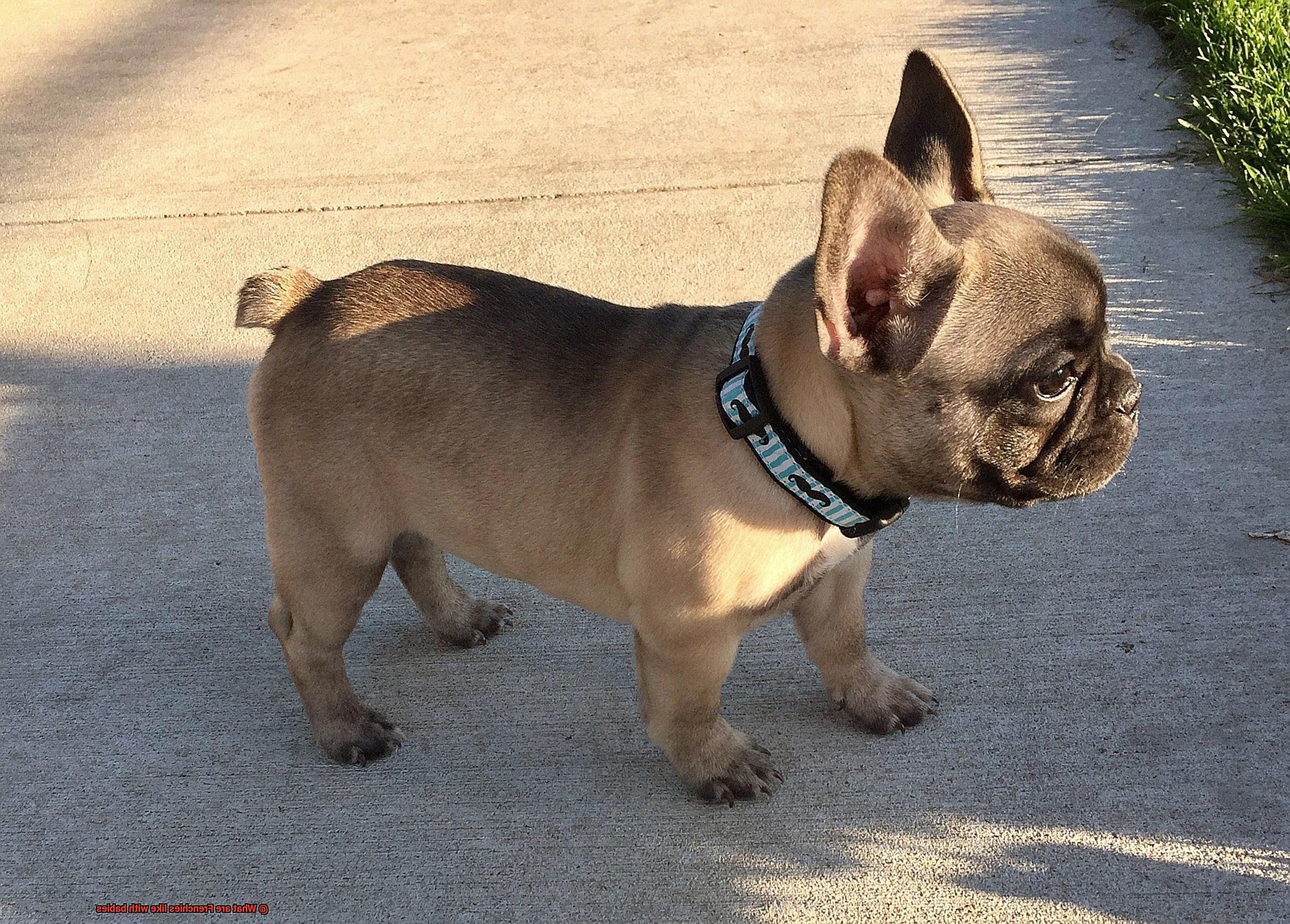
French Bulldogs, or Frenchies as they are affectionately called, are truly a breed apart when it comes to adaptability to different environments. Their calm and gentle nature makes them an ideal choice for families with babies. As a proud Frenchie owner myself, I have witnessed firsthand how these furry companions effortlessly adjust to the chaos that comes with having a baby in the house.
- Gentle and Patient Nature: Frenchies have a natural affinity for children and are known for their patience and gentle demeanor. They form strong bonds with babies and toddlers, making them the perfect playmates. Their affectionate nature shines through as they engage in gentle play, providing endless entertainment for your little one.
- Tolerance of Noise and Commotion: Babies bring noise and commotion into the household, but Frenchies take it all in stride. They are remarkably tolerant of the unpredictable sounds and activities that come with having a baby around. Whether it’s the cries of a newborn or the giggles of a toddler, Frenchies remain calm and composed.
- Low Energy Levels: Unlike hyperactive breeds, Frenchies have lower energy levels, which makes them well-suited to the demands of having a baby. They are content with shorter walks and indoor playtime, adapting effortlessly to the lower energy levels often associated with having a newborn or young child.
- Protective Instincts: French Bulldogs have a natural protective instinct when it comes to their human family members, including babies. They keep a watchful eye on their little ones, ensuring their safety at all times. With a Frenchie by your baby’s side, you can have peace of mind knowing that they are being looked after.
- Building Strong Bonds: Frenchies are highly social dogs that thrive on human companionship. They quickly become attached to their human family members, including babies, and enjoy spending time with them. This strong bond helps foster a sense of security and comfort for both the Frenchie and the baby.
However, it is important to introduce Frenchies to babies slowly and carefully. They have a tendency to become jealous or possessive, so proper supervision is necessary. Socializing Frenchies with babies from an early age can help establish a positive and harmonious relationship between them.
Playful Side of French Bulldogs and Babies
French Bulldogs, or Frenchies as they are lovingly called, are known for their playful and affectionate nature. As a proud Frenchie owner myself, I can attest to the joy they bring to families, especially those with babies. In this blog post, we will explore the playful side of French Bulldogs and how it can benefit babies. So grab a cup of coffee and get ready to learn why Frenchies and babies make the perfect playtime partners.

French Bulldogs – Gentle and Patient Companions
- French Bulldogs are naturally gentle and patient dogs, making them ideal companions for babies.
- They often display a protective instinct towards babies, ensuring their safety and well-being.
- Frenchies have a unique ability to sense the needs of babies, responding attentively to their cues.
Playtime Partners – French Bulldogs and Babies
- French Bulldogs enjoy being around children and are often seen playing and interacting with them.
- Their playful nature can encourage physical activity in babies, helping to stimulate their development.
- Playing with a Frenchie can also promote social interaction skills in babies, fostering early friendships.
The Clownish Behavior of French Bulldogs
- Frenchies are known for their clownish behavior, constantly finding ways to bring joy and laughter to both babies and adults.
- Their silly antics can turn any mundane playtime into a delightful adventure for babies.
Tolerance and Safety
- While French Bulldogs are generally tolerant of rough handling by babies, supervision is crucial to ensure the safety of both the baby and the dog.
- Teaching babies gentle petting and appropriate behavior around dogs is essential for a harmonious relationship.
Adaptability – Perfect for Families with Babies
- French Bulldogs are adaptable dogs, making them well-suited for families with babies or young children.
- Their low energy levels and easygoing nature allow them to seamlessly fit into the chaos of family life.

Supervising Interactions between Frenchies and Babies
French Bulldogs, or Frenchies, are renowned for their loving and gentle disposition, making them wonderful companions for babies. However, it is crucial to supervise their interactions to ensure the safety of both the baby and the Frenchie. In this blog post, we will delve into the importance of supervising these interactions, provide practical tips for introducing the two, and offer insights based on first-hand experience.
Safety First: Why Supervision is Vital
- Babies are naturally curious and may unintentionally provoke or startle a Frenchie.
- Frenchies, although generally protective of their family members, can become jealous or possessive.
- Vigilance during interactions prevents any potential accidents or harm.
Introducing Frenchies to Babies: A Gradual Approach
- Begin with short and controlled interactions to acclimate both the Frenchie and the baby.
- Increase the duration as they get more comfortable with each other.
- Observe body language and reactions to gauge their level of comfort.
Teaching Proper Interaction:
- Educate babies on how to interact appropriately, such as not pulling on ears or tails.
- Teach them not to disturb the Frenchie while eating or sleeping.
- Use positive reinforcement to reward both the Frenchie and the baby for appropriate behavior.
Recognizing Warning Signs:
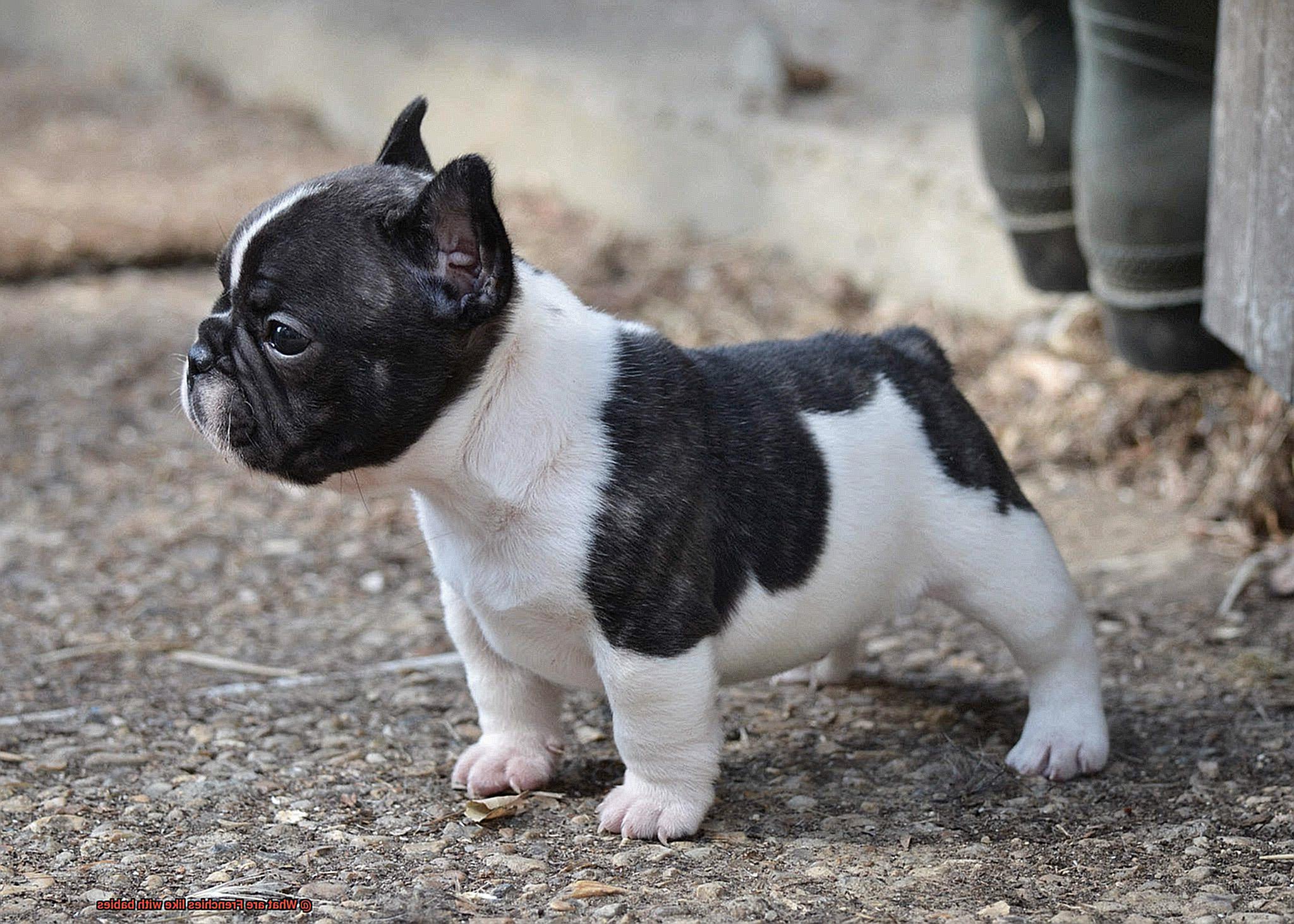
- Watch for signs of discomfort or aggression in either the Frenchie or the baby.
- Immediately separate them if any concerning behavior is observed.
- Seek professional guidance if needed to address any issues.
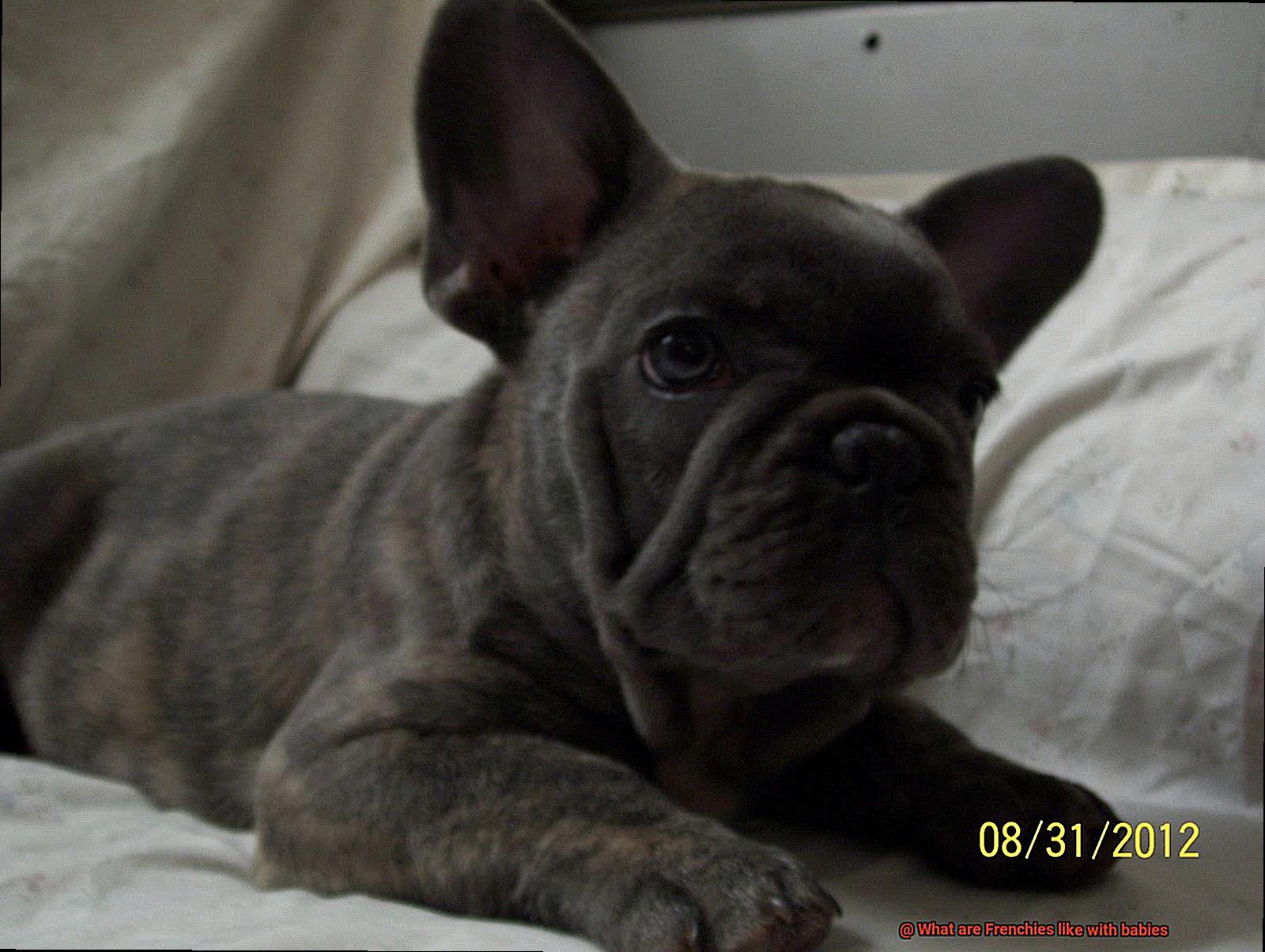

Establishing Boundaries:
- Provide a designated space for the Frenchie where it can retreat if it feels overwhelmed.
- Encourage respect for the dog’s personal space.
Conclusion:
Supervising interactions between Frenchies and babies is paramount in ensuring their safety and fostering a positive relationship. By following these guidelines and using your judgment, you can create a harmonious bond between your Frenchie and your little one, filled with joy, laughter, and cherished memories.
Individual Temperaments of French Bulldogs
As a proud French Bulldog owner, you may be wondering how to assess the individual temperament of your furry friend when it comes to being around babies. Every Frenchie is unique, and understanding their temperament is key to ensuring a safe and happy environment for both your pup and your little one.
Here are some tips based on research and personal experience to help you gauge your Frenchie’s behavior around babies:
- Observe Their Curiosity: Take note of how your Frenchie approaches the baby. Do they show curiosity, sniffing gently and wagging their tail? This is a positive sign that they are interested in the baby and potentially open to forming a bond.
- Assess Their Gentle Nature: Watch how your Frenchie interacts with the baby. Are they gentle, using soft paws and not jumping or pawing at the baby? This indicates that they have a calm temperament and may be well-suited for being around babies.
- Look for Signs of Anxiety or Stress: Pay attention to any signs of anxiety or stress in your Frenchie when the baby is present. These may include trembling, excessive panting, or avoiding the baby altogether. If you notice these signs, it’s important to address them and provide positive reinforcement training.
- Gauge Their Protective Instinct: Some French Bulldogs have a natural protective instinct when it comes to babies. They may become very attentive and keep a watchful eye on the little one. This is a positive sign that your Frenchie may be a great companion for your baby.
- Give Them Space: If your Frenchie seems unsure about how to interact with the baby initially, give them time and space to adjust. Allow them to approach the baby at their own pace and provide positive reinforcement when they display calm behavior.
Remember, even though French Bulldogs are generally good with babies, it’s important to supervise their interactions at all times. Accidents can happen, and it’s crucial to ensure the safety of both your Frenchie and your little one.
Positive reinforcement training is key when it comes to fostering a healthy and safe relationship between your Frenchie and your baby. Reward your Frenchie for calm behavior around the baby and gradually introduce them to different scenarios involving the baby. This will help create a positive association and strengthen their bond.
In addition to training your Frenchie, it’s equally important to teach your baby how to interact with the dog appropriately. Educate your little one about not pulling on the dog’s ears or tail, not bothering them while eating or sleeping, and not climbing on them. By setting boundaries and teaching proper behavior, you can create an environment where both your Frenchie and your baby can coexist harmoniously.
Socialization and Training for French Bulldogs
French Bulldogs are known for their affectionate nature, making them ideal companions for families with babies. However, proper socialization and training are essential to ensure a harmonious relationship between your Frenchie and your little one. In this guide, we will explore the importance of socialization and training for French Bulldogs when interacting with babies, providing expert insights based on first-hand knowledge and experiences.
The Significance of Socialization:
Socialization is the process of introducing your Frenchie to various people, environments, and situations to develop their behavior and adaptability. When it comes to babies, early exposure is key. Here’s why:
- Familiarity: By introducing your French Bulldog to babies in a controlled and positive manner, you help them associate infants with positive experiences.
- Emotional Bonding: Socialization helps cultivate a bond between your Frenchie and the baby, fostering a sense of trust and companionship.
- Stress Reduction: Well-socialized French Bulldogs are less likely to exhibit fear or anxiety around babies, creating a safer environment for everyone involved.
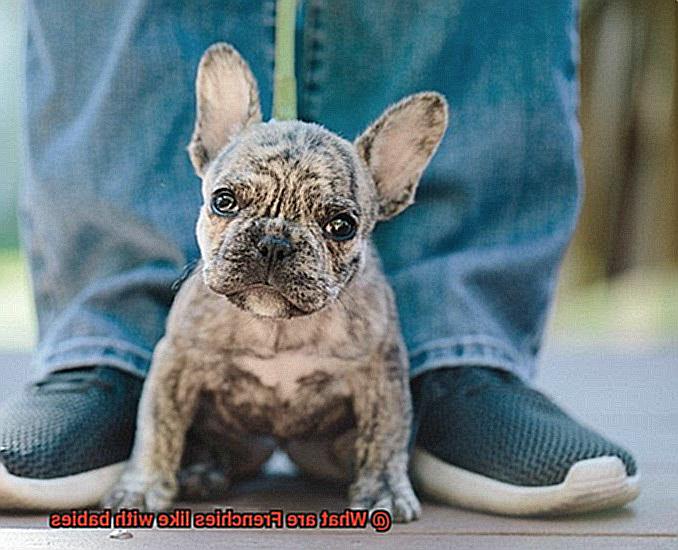
Implementing Obedience Training:
Basic obedience training is crucial for establishing boundaries and teaching your Frenchie appropriate behaviors around babies. Here are some key aspects to consider:
- Commands: Teach your Frenchie commands such as “sit,” “stay,” and “leave it.” These commands can be particularly useful when interacting with babies, ensuring a calm and respectful demeanor.
- Positive Reinforcement: Reward your Frenchie with treats, praise, or playtime for displaying desired behaviors around babies. Positive reinforcement strengthens the bond between dog and owner while promoting good behavior.
Supervision: Ensuring Safety at All Times:
While socialized and trained French Bulldogs are generally well-behaved around babies, supervision is essential. Here’s why:
- Accidents Happen: Even the most well-behaved dogs can unintentionally harm a baby due to their size or playful nature. Constant supervision prevents any unforeseen accidents.
- Early Warning Signs: By closely monitoring your Frenchie’s behavior, you can identify signs of stress, discomfort, or unease. Prompt intervention is crucial to prevent any negative interactions.
Gradual Exposure and Professional Guidance:
Introducing your Frenchie to your baby should be a gradual process. Start with short and supervised interactions, gradually increasing the duration as both dog and baby become more comfortable. If any signs of stress or discomfort arise, consult a professional dog trainer or behaviorist for further guidance.
Introducing a Frenchie to a Baby Gradually
Bringing a new baby into the family is an exciting and joyous occasion, but it can also be a stressful time for your French Bulldog. Frenchies are known for their affectionate and friendly nature, but they can also be sensitive and prone to anxiety. That’s why it’s crucial to introduce them to the baby gradually, allowing them to adjust and feel comfortable in their new role as a big brother or sister.
Creating a safe and comfortable environment for both your Frenchie and your baby is the first step in this process. Set up a designated space for your Frenchie where they can retreat to if they feel overwhelmed or need some alone time. This could be a separate room or a cozy corner with their bed and toys. Having their own safe space will help them feel secure and reduce any potential stress or anxiety they may experience.
Gradual Introductions: Familiarizing Your Frenchie with Baby-related Smells
Before bringing the baby home, you can start preparing your Frenchie by introducing them to baby-related smells. Bring home items such as blankets or clothing that have the baby’s scent on them. Allow your Frenchie to sniff and investigate these items, helping them become familiar with the new scent. This will help ease their transition when the baby arrives.
Establishing Boundaries and Clear Rules
Once the baby arrives, it’s important to establish boundaries and set clear rules for your Frenchie. Teach them commands such as “gentle” or “be calm” to encourage proper behavior around the baby. Reward your Frenchie with treats and praise when they exhibit calm and gentle behavior around the baby. Consistency is key here – make sure everyone in the household follows these rules to avoid confusion for your Frenchie.
Gradual Introductions: Observing from a Distance
Gradual introductions are crucial in ensuring a positive relationship between your Frenchie and the baby. Start by allowing your dog to observe the baby from a distance while on a leash. This will help them get used to the sight of the baby without feeling overwhelmed or anxious. Gradually decrease the distance between them as your Frenchie becomes more comfortable, always closely supervising these interactions.
Monitoring Body Language and Providing Positive Experiences
During these introductions, it’s important to monitor your Frenchie’s body language for any signs of stress or discomfort. Look out for behaviors such as excessive panting, pacing, or avoidance.
If you notice any signs of stress, give your Frenchie a break and try again later. It’s also important to involve your Frenchie in positive experiences with the baby. Encourage gentle interactions such as supervised petting or allowing your Frenchie to lick the baby’s feet (under close supervision). This will help foster a positive association between your Frenchie and the baby.
Monitoring the Behavior of a Frenchie Around Babies
Bringing a baby into a household with a French Bulldog can be an exciting and heartwarming experience. Frenchies are known for their friendly and affectionate nature, making them great companions for little ones. However, it is crucial to monitor their behavior around babies to ensure the safety and well-being of both your furry friend and your precious bundle of joy.
The Importance of Supervision:
While Frenchies are generally good with babies, close supervision is essential, especially during the initial stages. This ensures that any potential accidents or mishaps can be prevented. As a responsible owner, you play a vital role in ensuring that interactions between your Frenchie and your baby are safe and positive.
Reading Body Language:
A crucial aspect of monitoring your Frenchie’s behavior around babies is observing their body language. Their body posture, tail wagging, and eye contact can provide valuable insights into their feelings and comfort level. A relaxed Frenchie will have loose body language, a wagging tail, and soft eyes. Signs of stress or discomfort may include a tense body, raised hackles, or a stiff tail.
Reacting to Sudden Movements or Noises:
Babies can make sudden movements or loud noises that may startle or confuse your Frenchie. It’s important to closely monitor their reactions during such situations. Some dogs may become anxious, while others might simply be curious. By understanding their reactions, you can assess whether your Frenchie needs additional training or desensitization to feel more comfortable around babies.
Setting Boundaries and Establishing Rules:
Establishing clear boundaries and rules for interaction is crucial in preventing unwanted behaviors or accidents. Teach your Frenchie to respect the baby’s personal space and discourage jumping or rough play around them. Consistency in training and positive reinforcement can go a long way in shaping their behavior around infants.
Gradual Introductions:
Gradually introducing your Frenchie to your baby in controlled environments is key. Start with short, supervised sessions where the dog is on a leash or separated by a gate or barrier. Allow them to observe the baby from a safe distance and reward calm behavior with treats and praise. Over time, increase the duration and proximity of their interactions while prioritizing safety.
Educating Yourself and Family Members:
It is crucial to educate yourself and other family members about appropriate ways to interact with both your Frenchie and the baby. Teach children how to handle and approach the dog gently, avoiding rough play or pulling on ears or tail. By promoting positive interactions and a respectful environment, you can ensure a harmonious relationship between your Frenchie and your baby.
4VYKagH7_HU” >
Conclusion
Frenchies and babies, a match made in heaven. These delightful little dogs have a natural affinity for infants, making them the perfect companions for growing families. French Bulldogs are known for their gentle and affectionate nature, and this extends to their interactions with babies. They are incredibly patient and tolerant, making them great playmates for little ones.
Frenchies are also highly protective of their human family members, including the tiniest ones. They will keep a watchful eye on the baby, ensuring their safety at all times. With their sturdy build and muscular physique, French Bulldogs can even act as a gentle barrier between the baby and any potential hazards.
But it’s not just about protection – Frenchies also love to shower babies with love and attention. They will eagerly snuggle up next to them, providing warmth and comfort. Their soft fur makes for the perfect cuddle buddy, creating a bond that is both heartwarming and adorable.
Furthermore, French Bulldogs have an innate sense of empathy towards babies. They seem to understand when a little one is upset or in need of comfort. Their intuitive nature enables them to offer solace through gentle nudges or soothing licks.
In addition to being loving companions, Frenchies can also be great teachers for babies. As they grow up together, these dogs can help instill important values such as kindness, compassion, and responsibility in young children. The bond formed between a Frenchie and a baby can be truly special and beneficial for both parties involved.
In conclusion, French Bulldogs are exceptional with babies. Their loving nature, protective instincts, and ability to connect with infants make them ideal four-legged friends for growing families.




